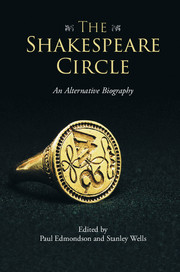Book contents
- Frontmatter
- Contents
- List of illustrations
- List of contributors
- Preface and acknowledgements
- General introduction
- Part I Family
- Part II Friends and Neighbours
- Part III Colleagues and Patrons
- 18 His fellow dramatists and early collaborators
- 19 His theatre friends: the Burbages
- 20 His fellow actors Will Kemp, Robert Armin and other members of the Lord Chamberlain's Men and the King's Men
- 21 His literary patrons
- 22 His collaborator George Wilkins
- 23 His collaborator Thomas Middleton
- 24 His collaborator John Fletcher
- 25 His editors John Heminges and Henry Condell
- Closing remarks
- Afterword
- Index
- References
20 - His fellow actors Will Kemp, Robert Armin and other members of the Lord Chamberlain's Men and the King's Men
from Part III - Colleagues and Patrons
Published online by Cambridge University Press: 05 November 2015
- Frontmatter
- Contents
- List of illustrations
- List of contributors
- Preface and acknowledgements
- General introduction
- Part I Family
- Part II Friends and Neighbours
- Part III Colleagues and Patrons
- 18 His fellow dramatists and early collaborators
- 19 His theatre friends: the Burbages
- 20 His fellow actors Will Kemp, Robert Armin and other members of the Lord Chamberlain's Men and the King's Men
- 21 His literary patrons
- 22 His collaborator George Wilkins
- 23 His collaborator Thomas Middleton
- 24 His collaborator John Fletcher
- 25 His editors John Heminges and Henry Condell
- Closing remarks
- Afterword
- Index
- References
Summary
One afternoon in the late summer of 1599 Robert Armin (the well-known ballad writer and comic) took a walk from his home on the north side of London, crossed the Thames, and went to visit the newly completed Globe playhouse, where Shakespeare and his company had just started to perform. Armin may well have gone to see the troupe earlier when they were based at the Curtain because that playhouse was just a short ramble across the fields from his front door. Back then, he would have seen ‘Will Shakespeare, Augustine Phillips, Henry Condell, Will Sly, Will Kemp, Richard Burbage, John Heminges, Thomas Pope, Christopher Beeston, and John Duke’, who are listed as performing in Ben Jonson's Every Man In His Humour in 1598 (Jonson 1616, p. 72). Some of this company were familiar to Armin as neighbours: Augustine Phillips and his apprentice, the boy actor Christopher Beeston, for example, attended his church (Denkinger 1929). All of them were famous and Armin must at least have known them by sight. In 1599 he almost certainly saw the newish comedy Much Ado About Nothing. We can deduce this because Armin's A Pill to Purge Melancholy briefly makes mention of ‘one pleasant conceit or other of Monsieur de Kemp on Monday … at the Globe’ and refers more than once to ‘the Ass's burden’ (A4b). This looks like an allusion to Dogberry (who is obsessed with having been called an ‘ass’ (Much Ado 4.2.74, 76, 84; 5.1.248, 298)), a role that we know Shakespeare had written specifically for Kemp. As he looked at the stage from an ‘upper room’ Armin must have wondered what it would be like to work with William Shakespeare. In less than a year he would know at first hand.
The year between the late summer of 1599 and that of 1600 is a particularly rich time for which to isolate the circle of Shakespeare's fellow actors. This was the most important single moment of transition for the company. Not only would Armin take over from Kemp, the newly built Globe would also tie Shakespeare more closely to a small group of theatre owners (or ‘housekeepers’), a circle even more exclusive than that of the Chamberlain's fellowship. Richard Burbage, John Heminges, Augustine Phillips and Thomas Pope, like the playwright, owned a portion of the playhouse and Armin would soon become part of that group.
- Type
- Chapter
- Information
- The Shakespeare CircleAn Alternative Biography, pp. 261 - 274Publisher: Cambridge University PressPrint publication year: 2015



